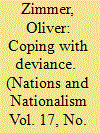| Srl | Item |
| 1 |
ID:
107273


|
|
|
|
|
| Publication |
2011.
|
| Summary/Abstract |
This article highlights two processes that shaped Swiss nationhood in the long nineteenth century. The first concerns the competition between different nation-states and the nationalist visions these contests engendered. In a Europe dominated by the norm of the culturally and ethnically homogenous nation, the Swiss authorities, public intellectuals and various political representatives were desperate to display an image of national authenticity to the outside world. The result was a nationalism that combined voluntaristic and organic elements. In the second and main part of this article, the focus turns on citizenship; it is conceived not only as a social and legal institution, but also as a cognitive prism through which people defined their membership in the national community. Remarkably, the authority in granting national citizenship to foreign nationals remained firmly in the hands of the cantons and, above all, the Swiss municipalities. In practical terms, this meant that the Gemeinde provided the institutional and cognitive frame through which nationhood was primarily experienced, imagined and defined. While Switzerland represents a particularly strong case of a communalist polity, it should not be treated as unique. Instead, it should alert us to a potentially fertile yet little-explored area of research: what might be called the communal embededdness of the national(ist) imagination.
|
|
|
|
|
|
|
|
|
|
|
|
|
|
|
|
| 2 |
ID:
144844


|
|
|
|
|
| Summary/Abstract |
The promotion of intensive farming through organic and fair trade certification appears contradictory to the increasing significance of non-farm income sources in rural Asia as well as in many other parts of the rural South. By observing a sugarcane producer co-operative comprising land reform beneficiaries in the Philippines, this paper explores the reality of livelihood diversification as practised by member households of the certified co-operative, focusing on the compatibility of certification-supported farming with diversified activities. In this case, diversification at the household level progressed both away from farming and into farming. Behind the long-term use of agricultural certification, there are compelling reasons for continuing both certification-supported farming and diversified activities, and for employing mechanisms that further the compatibility at all phases between the former and the latter, and maximising income-generating opportunities. The operation of communal land with agricultural certification may be an effective form of assistance to land reform beneficiaries who share a strong desire to be landowners.
|
|
|
|
|
|
|
|
|
|
|
|
|
|
|
|
| 3 |
ID:
143380


|
|
|
|
|
| Summary/Abstract |
In the wake of the supermarket revolution, consumer concerns over food safety in China have resulted in an accelerated change towards the procurement of food products from modern retail channels. We employ discrete choice experiments to assess consumer preferences for food quality attributes across various retail channels using primary data from Beijing, China. Results suggest that consumer willingness to pay for food safety is retail channel invariant, while preferences for organic and Green Food certification are product and retail channel specific. We find evidence of emerging consumer preferences for animal welfare attributes. Implications for food retail managers and agribusinesses are discussed.
|
|
|
|
|
|
|
|
|
|
|
|
|
|
|
|